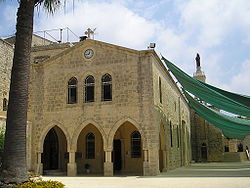Deir El Kamar
|
Deir el Qamar دير القمر Darel Camar |
|
|---|---|

Church of Saidet et Talleh
|
|
| Location within Lebanon | |
| Coordinates: 33°42′N 35°34′E / 33.700°N 35.567°ECoordinates: 33°42′N 35°34′E / 33.700°N 35.567°E | |
| Country |
|
| Governorate | Mount Lebanon Governorate |
| District | Chouf District |
| Time zone | EET (UTC+2) |
| • Summer (DST) | EEST (UTC+3) |
| Dialing code | +961 |
Deir al-Qamar (Arabic: دير القمر), meaning "Monastery of the Moon"is a village in south-central Lebanon, five kilometres outside of Beiteddine, consisting of stone houses with red-tiled roofs.
During the 16th to 18th centuries, Deir al-Qamar was the capital and the residence of the governors of Lebanon. It is also notable for its 15th-century Fakhreddine Mosque, Fakhreddine II Palace, and other historical palaces and administrative buildings. The 17th century Deir al-Qamar Synagogue is also in the village, although closed to the public. During its peak, the city was the centre of Lebanese literary tradition. It was the first village in Lebanon to have a municipality in 1864, and it is the birthplace of many well known personalities, such as artists, writers, and politicians. It was the winter capital of the Druze Cancimat of Lebanon (1840-1860), the summer capital being Baakleen.
Deir al-Qamar is a known as the Capital of Emirs. From its palaces, Mount Lebanon was governed from the 16th century until the 18th century. People from all religious backgrounds lived there and the town had a mosque, synagogue and Christian churches.
In the year 1860, Deir al-Qamar was destroyed during the civil war between Druze and Christians during which the town was set ablaze. Napoleon III sent a French contingent to rebuild it, recalling France ancient role as protector of the Christians in the Ottoman Empire as established by a treaty in 1523.
In 1864, Deir el-Qamar elected the first municipality in the Arab provinces of the Ottoman Empire.
A census done by the Ottomans during Qorqmaz bin-Maan's reign, Fakhr-al-Din II's father, counted 156 men in Deir al-Qamar who were all Druze. Today, 85% of Deir al-Qamar's inhabitants are Maronites and 14% are Melkites.
...
Wikipedia

